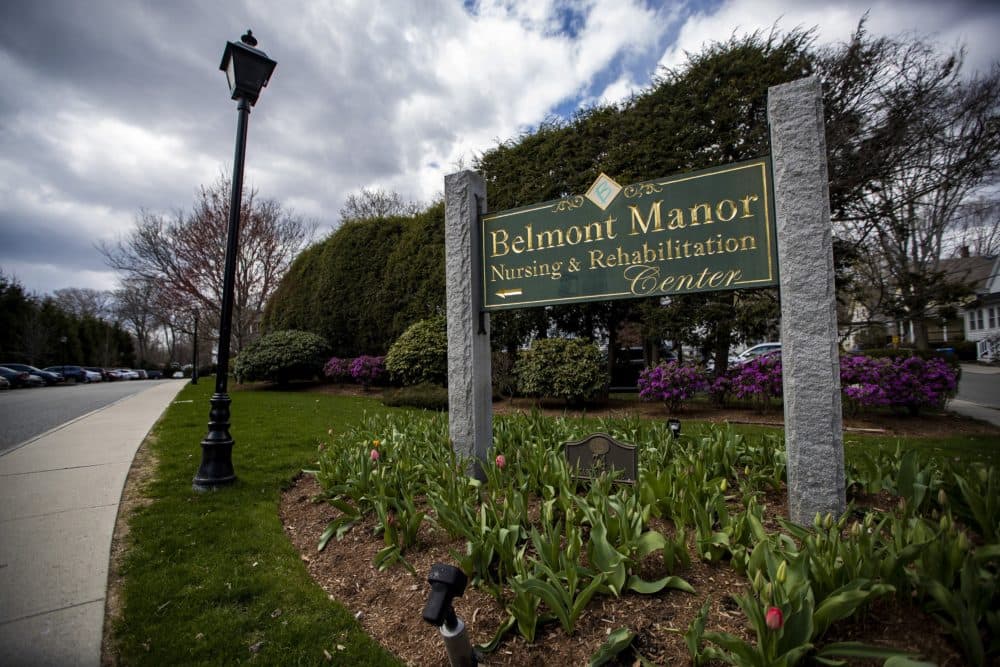Advertisement
30 Deaths, Another 86 Positive Tests: Nearly All Belmont Manor Nursing Home Residents Have The Coronavirus

It began with a fever and a dry cough on March 28. The following day, the elderly man was transferred from the Belmont Manor nursing home to the hospital, where he was tested for the coronavirus.
The results came back positive on March 30, nursing home administrator Stewart Karger told Wicked Local; Belmont Manor, a 135-bed family-owned and operated nursing home, had its first coronavirus case.
Less than three weeks later, the number of cases there have exploded, highlighting just how vulnerable people who live and work in long-term care facilities are in the pandemic.
As of April 15, 30 residents have died from COVID-19 -- four of whom had been transferred to the hospital. Another 86 residents have tested positive for the virus, and two others await test results, Belmont Manor spokeswoman Diana Pisciotta said.
In an email dated April 11, Karger reported that 14 residents had died, meaning that fatalities at the nursing home more than doubled in five days.
"Every member of the Belmont Manor team is heartbroken by the losses of beloved members of our community," he said in a statement. "From the beginning of this pandemic, we have taken every possible step to address this fast moving situation."
Meanwhile, 59 of the nursing home’s 190 employees have tested positive. Belmont Manor is hoping to get all employees tested soon, Pisciotta said.
Older adults have been particularly hard hit by the coronavirus because they often have other underlying health issues. In Massachusetts, 37% of people testing positive for the virus are 60 or older, and according to state data, the vast majority of recent fatalities have been people in their 70s and older.
The state has also reported that as of Wednesday afternoon, 530 people have died from COVID-19 at long-term care facilities in Massachusetts, and another 4,163 residents and employees have tested positive for the virus. To date, 222 long-term care facilities in the state have at least one positive case.
Advertisement
“This is an incredibly infectious and unpredictable virus that is lethal to the elderly and those with multiple medical conditions, which is exactly our nursing home resident population,” Tara Gregorio, of the Massachusetts Senior Care Association, told WBUR in an email.
Leaders at Belmont Manor declined interview requests, but noted in a statement that staff are using “aggressive infection control methods” and “carefully monitoring all residents” for signs of the virus.
Complicating matters at Belmont Manor — and other long-term care facilities — is the fact that some residents who have the virus are asymptomatic. Though the National Guard is testing people at nursing homes around the state, demand still exceeds supply. Earlier this week, Gov. Charlie Baker said that 4,500 seniors at 264 long-term care facilities had been tested, but that another 77 facilities had requested at least 8,600 more tests.
“Testing is crucial for a number of reasons, but most of all, it gives us the opportunity to identify and then isolate people who have tested positive and to make sure they get treatment," Baker said. "It helps us understand where the outbreaks are and to keep people informed with respect to infection, even if they don't have symptoms, to slow the spread."
But not everyone at Belmont Manor could get a test easily. An email from Karger dated April 11 said that only symptomatic residents were being tested.
"We've had the same experience as other long-term care facilities in that at the outset, because of limitations on testing and testing supplies, we were only able to test symptomatic residents," Pisciotta said. She added that the National Guard has come back at least twice, and that as of now, all residents have been tested.
Lisa Kimball’s 96-year-old mother, Sandy Kimball, is one of the people who got tested when the National Guard came back. Kimball said she learned Wednesday that her mother has the virus — despite showing no symptoms.
The diagnosis, though disheartening, wasn’t particularly surprising. Kimball's mother requires assistance for most daily tasks, meaning aides are constantly in contact with her.
“It’s like a petri dish in there,” Kimball said. “How can anyone get away from it?”
